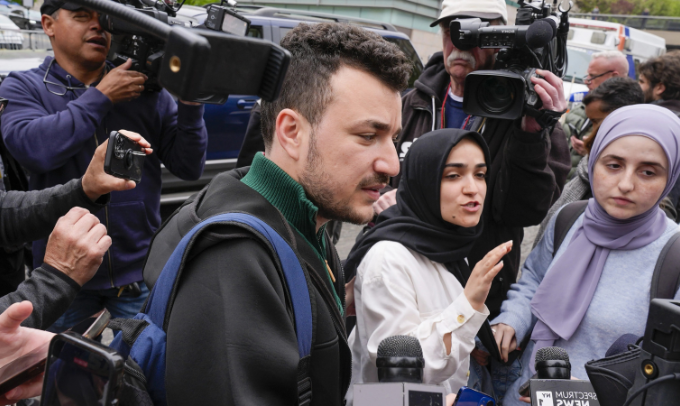US , Apr 12, 2025
The deportation of Palestinian activist Mahmoud Khalil has sparked widespread controversy and outrage across global human rights organizations. The court ruling that authorized Khalil’s deportation, which followed accusations of political activism, has drawn criticism from various advocacy groups and international communities.
The Deportation and the Legal Ruling
Khalil, a well-known figure in Palestinian activism, had lived in the United States for several years advocating for Palestinian rights. However, his deportation came after a legal battle that focused on his visa status and political affiliations. U.S. immigration authorities claimed that Khalil’s presence violated visa terms due to his activities, which they described as politically motivated. While the government argued that the deportation was in line with national security protocols, many saw this as a politically charged decision.
The court ruling to proceed with Khalil’s deportation has drawn a strong backlash, with critics accusing the government of attempting to silence dissent. Khalil himself has maintained that his activism was focused on peaceful advocacy for Palestinian rights and that he was not involved in any illegal activities. His supporters argue that his deportation is an infringement on free speech and human rights.
Reactions from Advocacy Groups
Human rights groups have been vocal in condemning the deportation. Organizations such as Amnesty International and Human Rights Watch have raised alarms, stating that Khalil’s removal from the U.S. sets a dangerous precedent for the treatment of political activists in the country. They argue that deporting individuals based on their political beliefs undermines the principles of democracy and freedom of expression.
Many have also pointed to the wider implications for activists from marginalized communities, especially those who advocate for causes that may not align with mainstream political narratives. Khalil’s case has ignited discussions about the balance between national security concerns and the protection of civil liberties.
The Global Outcry
Internationally, the deportation has added to the ongoing debate about the treatment of activists and refugees in Western countries. While the U.S. government asserts that its immigration policies are necessary for national security, critics believe this decision reflects a broader trend of political repression, particularly for individuals speaking out against government policies.
Protests in support of Khalil have been seen in various parts of the world, with activists and citizens voicing their opposition to the decision. The case has also highlighted the risks faced by individuals in exile who speak out against powerful governments, adding to global concerns over the erosion of political freedoms.
Conclusion
The deportation of Mahmoud Khalil remains a contentious issue. As the legal and political ramifications unfold, it serves as a stark reminder of the ongoing tensions between national security, immigration law, and the fundamental rights of political activists. As advocates continue to challenge the ruling, Khalil’s case remains a symbol of the struggles faced by political dissidents worldwide.













